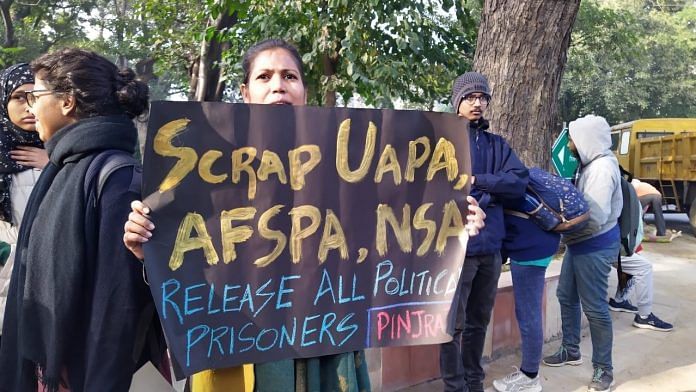
New Delhi: Four former Supreme Court judges Saturday spoke out against rampant abuse of some laws, saying the growing trend of police agencies invoking Unlawful Activities Prevention Act (UAPA), sedition law and National Security Act (NSA) should be curtailed by making individuals accountable for cases that end up either in a discharge or acquittal.
Speaking at an online seminar organised by the Campaign for Judicial Accountability and Reforms on UAPA: Democracy, Dissent and Draconian laws, Justices (retd) Gopala Gowda, Deepak Gupta, Aftab Alam and M.B. Lokur said the use of these laws was primarily aimed to stifle dissent, an essential element in democracy.
The misuse has led to instances such as the death of Jesuit priest Stan Swamy without a trial (in the Elgar Parishad case), they pointed out.
The former judges highlighted the vague definition of terror under UAPA as well as sedition. Both, they said, need to be defined through judicial pronouncements.
‘Watali judgment tied both hands of defence’
Justice Gopala Gowda particularly called for a re-look of a 2019 Supreme Court verdict that is said to have made grant of bail tougher in UAPA cases.
He said the Zahoor Ahmad Shah Watali judgment tied both hands of the defence by preventing any substantial challenge to the case of the prosecution. The ruling, explained Justice Gowda, does not permit courts to even engage in a detailed analysis of prosecution case while considering bail under UAPA and to weigh whether evidence adduced by prosecution is even sufficient or not.
Elaborating on the UAPA provision that makes bail virtually impossible for an accused during trial, Justice Deepak Gupta said a section along with the Watali judgment mandates the courts to consider whatever the prosecuting agency discloses in their charge sheet in a matter as prima facie true.
“A provision that denies power to superior courts to grant bail, denies judicial review to an accused is unconstitutional,” he added.
‘UAPA has failed’
In UAPA cases, the process is the punishment, explained another retired SC judge, Justice Aftab Alam. He presented an audit of cases under UAPA to point out there was a low rate of disposal of cases and high rate of pendency under the law.
“I submit, UAPA has failed us on both accounts, national security and constitutional freedoms,” Justice Alam added.
In the past, the judge said, terrorist offences accounted for a small percentage of violent crime. But now with reclassification of terrorist offences as an offence under UAPA, internal dissent is being posed as a threat to national security. As a result, the real threat to the defence of our country fails to get attention, the judge added.
“We must not forget scores of Indians who get acquitted after years with broken lives and practically no future,” the judge said.
‘Akin to soft torture’
Former SC judge Justice M.B. Lokur spoke about fixing liability and accountability on officials in cases where those charged with UAPA, sedition or NSA are found innocent. He said long periods of incarceration or denial of bail to accused in such cases, particularly on medical grounds, is akin to a “soft torture”.
“Mental health (of an undertrial) is equally important, if not more important, because this (jail term) is going to remain for the rest of your life. Not only their life, but the lives of their family and children. They will remember it,” the judge said.
Also, sharing her views at the panel discussion, former Patna High Court judge Justice Anjana Prakash said the hallmark of a good legislation is to be definite and incapable of misinterpretation. But both UAPA and sedition are vague, susceptible to misuse, she said.
Prakash also said the UAPA provision on bail dislodges the presumption of innocence vis-à-vis an accused, which is against the UN human rights convention.
She added: “Even UN Security Council has come to the conclusion that there’s misuse of these provisions. How could courts have not, I fail to understand this.”
Subscribe to our channels on YouTube & Telegram
Why news media is in crisis & How you can fix it
India needs free, fair, non-hyphenated and questioning journalism even more as it faces multiple crises.
But the news media is in a crisis of its own. There have been brutal layoffs and pay-cuts. The best of journalism is shrinking, yielding to crude prime-time spectacle.
ThePrint has the finest young reporters, columnists and editors working for it. Sustaining journalism of this quality needs smart and thinking people like you to pay for it. Whether you live in India or overseas, you can do it here.